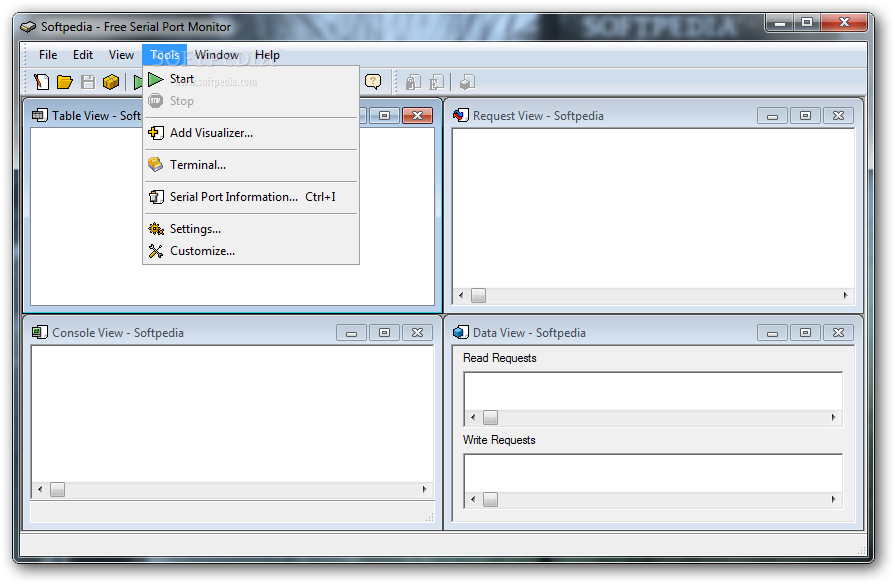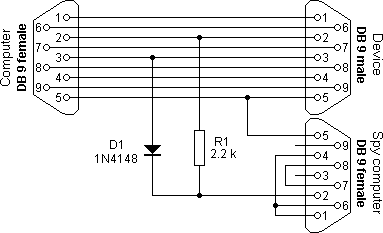Open Serial Port Monitor Free open source application to monitor traffic over a serial port. The Serial Monitor plugin lets you monitor serial port activity, including open, close, serial setting change, control/status line change and of course, the actual.
I'm reverse-engineering a serial protocol and getting frustrated by bad tools. Does anyone know of a good, free tool for logging data to/from serial ports on Windows? Requirements: • Must be free • Must not take control of the port (i.e.
Torrent Trackers hash 10d6bf11feedb0038d456b32fc12ef udp://tracker.leechers-paradise.org:6969/announce 1 hour 57 1 udp://tracker.coppersurfer.tk:6969/announce 3 hours 39 0 udp://tracker.opentrackr.org:1337/announce 3 hours 3 0 udp://tracker.port443.xyz:6969/announce 10 hours 2 0 udp://explodie.org:6969/announce 40 mins 1 0 udp://tracker.internetwarriors.net:1337/announce 3 hours 1 0 udp://open.demonii.si:1337/announce 5 hours 1 0 10 hours 1 0 udp://tracker.cyberia.is:6969/announce 10 hours 1 0 10 hours 1 0. Sony acid pro 8 torrent.
Must hook the file APIs or the kernel rather than trying to open the device) • Must have some sort of filtering features • Writes either human-readable or binary logs, preferably in an easy to parse format Any ideas? Portmon works, but its logs are difficult to work with and its filters are effectively useless; I've also tried a few commercial tools and nothing seems to fit the bill.

Well, as far as i know, IoGetDeviceObjectPointer() can not be used for all devices, specially when those devices already 'being opened' by another application. But there is another way to do 'attach and detach device', by creating a filter driver for those devices, modify some registry(ies) and let the PnP Manager and/or I/O Manager do that for you. For the detail how to do this, you can see the the sample in WDK, unfortunately i forgot what sample for specific, but i think (if i'm not mistaken) sample about disk performance. Member 10398370 7-Jan-14 21:58 7-Jan-14 21:58 Hello,Good afternoon,I have a question need to ask you. In the filter driver development, when there is data in the data queue, using the event to notify the application. Create an event in the application, It is passed to the driver via DeviceIoControl. While waiting for an event using threads in the application, there is a signal event, to fetch data.

Such a program structure, when the application is running, and the serial transceivers the data transceiver, PC happens blue screen. If the application and the serial are not both running, PC does not blue screen.what causes the problem? In your routine, the application uses the OVERLAPPED structure, does OVERLAPPED I / O in the filter driver is necessary?
Thank you very much. Member 10398370 wrote:Hello,Good afternoon,I have a question need to ask you. In the filter driver development, when there is data in the data queue, using the event to notify the application. Create an event in the application, It is passed to the driver via DeviceIoControl. While waiting for an event using threads in the application, there is a signal event, to fetch data. Such a program structure, when the application is running, and the serial transceivers the data transceiver, PC happens blue screen. If the application and the serial are not both running, PC does not blue screen.what causes the problem?
Well, unfortunately I've never use that event mechanism, so I can tell you nothing. Member 10398370 wrote:In your routine, the application uses the OVERLAPPED structure, does OVERLAPPED I / O in the filter driver is necessary? Actually it is just a trick. I was using OVERLAPPED structure, create asynchronous I/O, so I can make the handle of I/O request invalid from another thread by issuing CloseHandle() thus stopping 'the loop reader' (check out CDkPortClient::GetData(.) in file DkPortClient.cpp), without that 'the loop reader' will not stop and this will make application unstable or hung. Note that, this is the behavior of window application not DOS application. In DOS application I can make 'the loop reader' without create asynchronous operation, just create the loop in another thread then make handle invalid in the main thread, maybe this because NTVDM, which running below DOS application, might do some filtering mechanism before I/O operation reach the kernel.
New News
- Shabloni Plakatov I Stengazet K Yubileyu Zhenschini 50 Let
- Dzhazovie Pesni Dlya Vokaljnogo Ansamblya Noti
- Visio Stencils Patch Panel
- Oficialjnaya Proshivka Lenovo A536
- Yourkit Java Profiler 12 Crack
- Buku Permata Yang Hilang Download Full Version
- Madagascar 2005 Dublat In Romana Torent
- Shpak English For Economists And Businessmen Otveti
- Adobe Photoshop Cs5 Language Pack Engb Google Drive
- Linejnij Vihod V Fm Modulyatore4775424
- Gotovaya Baza Dannih Biblioteka Access
- Trafareti Ovoschej I Fruktov Dlya Virezaniya Iz Bumagi